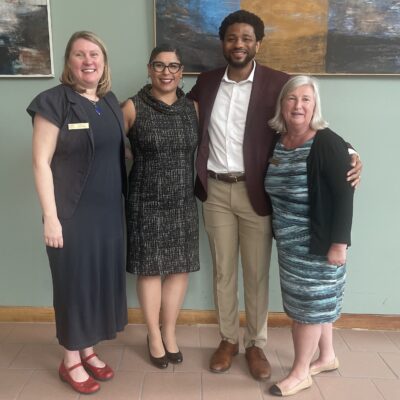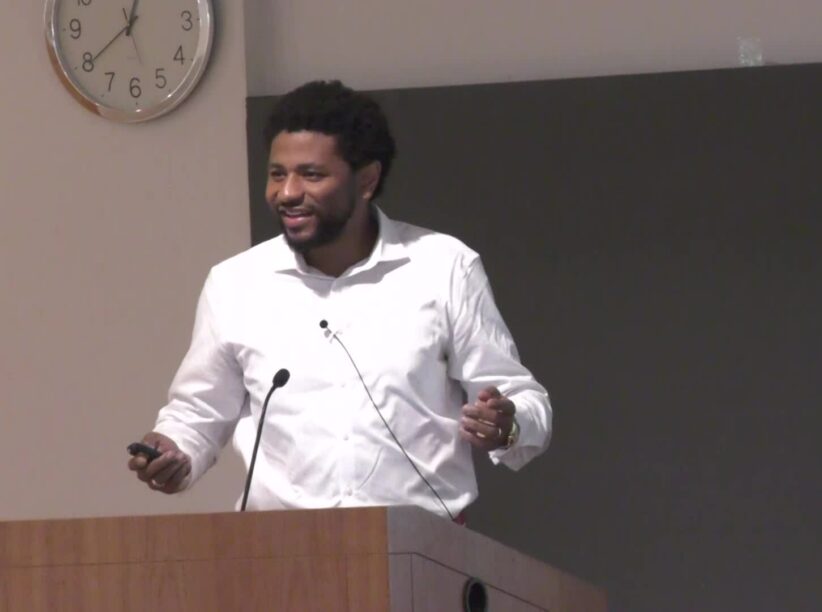Endless Opportunities: Institute Prepares Aspiring Faculty

Colleen McLinn, associate dean for professional development; Sara Xayarath Hernández, associate dean for inclusion and student and faculty engagement; Damani White-Lewis, assistant professor of higher education at the University of Pennsylvania Graduate School of Education; and Christine Holmes, director of postdoctoral studies
July 3, 2023
By Katya Hrichak
The fifth Future Professors Institute invited aspiring faculty from Cornell, Sloan Foundation-funded initiatives, Ivy+ institutions, and Bouchet Society member institutions to two days of opportunities to engage with faculty from a diversity of backgrounds and institutional types. The hybrid event took place on June 6 and 7.
Offered every other year, the Future Professors Institute concludes the NextGen Professors Program, a professional development and group mentorship opportunity for Cornell postdocs and advanced doctoral candidates that was initiated in 2017. Applicants are selected for a year-long cohort experience for their demonstrated interest in a faculty career and their contributions and commitment to advancing diversity, equity, and inclusion in academia.
This year’s Future Professors Institute featured a keynote on navigating academia and panels on exploring institutional fit, academic careers outside of the tenure track, and establishing your scholarship and a research agenda as a new faculty member.
“I want to thank all of the faculty and administrators from within and beyond Cornell who have generously agreed to participate in this year’s institute as panelists as it is their narratives, insights, and guidance that are critical to helping make pathways into and through the professoriate and other academic positions more accessible and manageable,” said Sara Xayarath Hernández, associate dean for academic and student and faculty engagement, during the introductory remarks.
Dr. Damani White-Lewis, assistant professor of higher education at the University of Pennsylvania Graduate School of Education, delivered the institute’s keynote to an in-person and virtual audience, titled, “Successfully Navigating Academia: Structural and Agentic Lessons for Workloads, Writing, and the Workforce.”
In his talk, White-Lewis shared his research into how faculty workloads and careers can be re-envisioned and reimagined as well as how aspiring faculty can prepare themselves for success through managing the three Ws: workloads, writing, and the workforce. He also emphasized the importance of personal wellness and how this relates to the three Ws.

“I realized that so much of our research in higher education is focused on supporting students. But there’s a back curtain that we rarely unveil, which is the educational administration of higher education,” he said. “How can we support faculty to support students?”
White-Lewis offered insight into the overarching structures of academia and how individuals’ career paths may interact with those structures. He gave the example of not getting a job, telling those in the audience to remember that the decision may have had less to do with the applicant and more to do with the politics, personalities, and preferences existing in the department.
“I think there’s power in recognizing that there are certain things that we’re responsible for,” he said. “But don’t feel solely responsible for any kind of shortcoming or failure.”
He also encouraged the aspiring faculty listening to believe in themselves and the opportunities yet to come.
“Every opportunity that came to me, I thought, ‘Well, this might the last one. I mean, if I don’t take this, then how will I get my name out there?’ The opportunities keep coming,” he said. “I earnestly believe that just by being in this room, opportunities are going to be endless. They will come, especially if you leverage networks.”
A recording of Damani-Lewis’s talk is available on Cornell Video on Demand.
“If a thing is humanly possible, consider it to be within your reach. If anything is humanly possible, you can do it,” he said.
The Future Professors Institute is co-sponsored by the Graduate School Office of Inclusion and Student Engagement, Future Faculty and Academic Careers, and the Office of Postdoctoral Studies and has been funded by NSF Grant No. 1647094; CIRTL AGEP.
